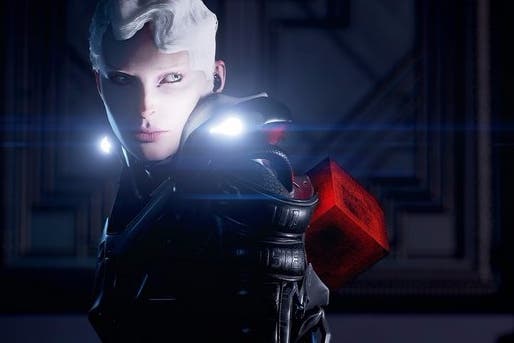Echo feels like the ultimate conclusion to Hitman
Eyes wide shut.
I'm not sure how you feel about eye contact, but even if you really, really love it, Echo is going to test you. Its menu screen, for starters, is a huge eyeball, lashes thick and curling and as weird and alien as real, human lashes, its pupil darting around as you hover between the usual options. Phew! Once you've gotten past that, you're up for a lengthy opening ramble through an orbiting spaceship where you have emerged from a century of cryo-sleep, down to a planet where ice fields turn out to be endlessly replicated white cubes, and beneath that to a vast procedural palace.
All this time you are being watched, of course. Your ship's AI is tracking your every move and can't wait to tell you how much he - it? - hates you. And then this palace, filled with baroque furniture and clear white light to invoke all those 2001 memories is also quietly agitated by the act of seeing. The shiny floors have a pattern that works like an optical illusion, the walls are often mirrored or home to doors that come studded with bland marble faces. Everything is ready to reflect an image or bend it into some weird new shape, and then the baddies turn up and Echo shows its hand, because the baddies are you, and the baddies' big trick is that they are watching you.
This is Echo's big selling point, inevitably: murderous AI that doesn't know how to do much until you start murdering it yourself, by which point you realise that you're simultaneously teaching it how to murder you right back. Each challenge in Echo - get from here to there, collect enough of these to open a door, grab one of those from a distant point and bring it back to this point again - is broken down into a series of stages. You mingle amongst the murderous clones. You pick a few off. The game notices the ways you've been picking them off and powers everything down. Lights out. When the lights come on again, the clones are all back but they've learned to do the things you've been doing.
It's often contrived, but that doesn't matter. You'll enter a room where the clones are on little islands among channels of clear water they won't step into. To get where you're going, you need to step into the water yourself, and for a while that's fine, until the room reboots and then the clones are wading in after you. There's no way to avoid stepping in the water - none that I could see at least - but maybe, if I was a bit stealthier, I could have avoided detection as I did so. I don't know, and it doesn't really matter, does it? Because being seen is what this game is all about: if you're perfectly stealthy, the AI never gets to show off its greatest tricks.
There are two things about Echo I think are truly fascinating. The first could be called a matter of lineage. Echo's made by a small Danish team who come from IO Interactive, the studio behind Hitman. And so it feels, if not like a sequel to Hitman, than a measured and rather chilly response to it. You had to worry about being spotted in Hitman, but the real gist of the game, the core of it, was about you watching a world and the things going on in it, watching the human clockwork, and then figuring out how to insert yourself into all these clicking, whirring sequences. Echo is an inversion of that. You're the one with the dull sequence to carry out - you're a Hitman civilian in essence, running back and forth across the map to hit your marks one after the other - and the Echos are the role you used to enjoy in Hitman. They watch you. They learn from you. They learn how to blend in and how - ultimately - to finish you off.
And it turns out that, once you're part of the clockwork, looking out at a system from the inside, it doesn't actually feel much like clockwork anymore. Echo's a fabulously messy game, because you're always trying to undo your own messes. But it's also, and this is the other thing I can't stop thinking about, easily, hands-down the most oppressive game I have ever encountered. There's that long opening trudge, which is filling you in on the game's backstory, sure, and also teaching you about a recharging energy system that governs your actions, but it's also leading you deep, deep underground into a maze of bewildering and repetitive architecture, a truly procedural landscape, that promises to go on forever and ever. This is the real value of that long, slow opening, I think, and once you're down there, there are suddenly all these eyes on you, the light is suddenly so bright and the halls so busy with clones and yet - because they are clones - simultaneously so empty that it's hard not to feel that the whole thing really has it in for you.
Amazing stuff, in other words: a science fiction game that makes you hate yourself by throwing you into a world that hates you even more. It feels like the ultimate conclusion to Hitman, in many ways - the deadly payoff for all that guilty pleasure.


